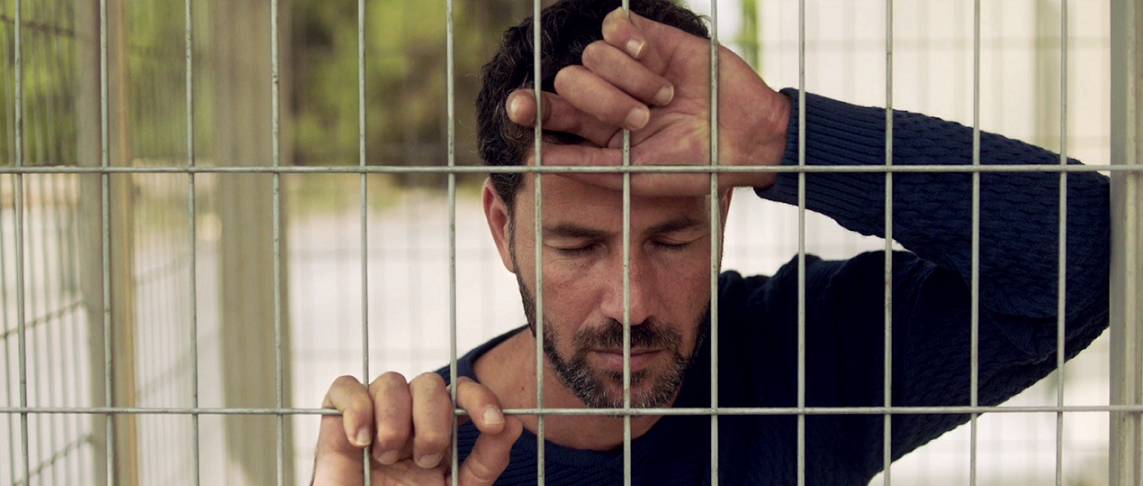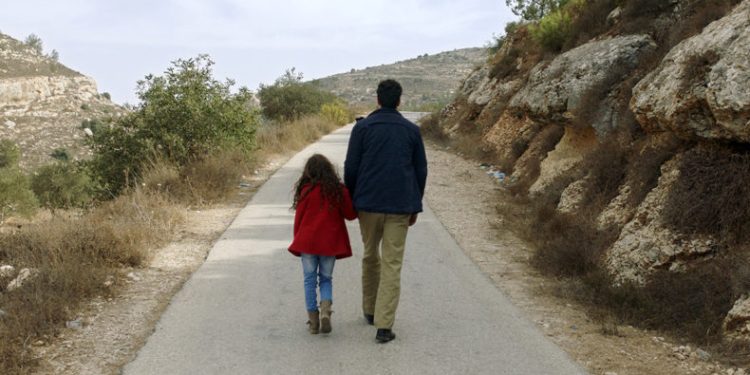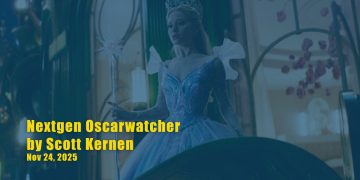The way director Farah Nabulsi mixes fiction with harsh reality is nothing short of astonishing. Her Oscar-nominated short film, The Present, is simple in its creation, but watching the film is an emotional and tense experience. Last week, she deservedly took home the BAFTA for British Short Film.
Yusef wants to run a simple errand and pick up a new fridge for his wife for their wedding anniversary. This seemingly menial task, however, takes hours when he and his daughter venture into the West Bank and they are stopped at Israeli checkpoints and detained for no reason at all. Imagine what it would be like if you forgot something at the store and then had to contend with several hours of wait time just because guards want to mess with you. The Present chronicles one man’s exhausted plight to return home.
It was important to Nabulsi to show these harsh realities — the checkpoints aren’t meant for border safety but for control. There is no reason for these checkpoints to exist when they are clearly in place to apply pressure and frustration to Palestinian citizens.
At the heart of her film is the incredible performance from Saleh Bakri as Yusef. His expressive face registers every ounce of anger, frustration, and resilience of a man who is humiliated in front of his young daughter just for wanting to purchase something for his wife. Nabulsi never backs away from the honesty of those emotions, and The Present is such a strong contender because of her fearlessness.
Please note: this conversation talks about the entirety of The Present. We strongly urge you to watch the film before reading this interview.
Awards Daily: You really establish the story very early on without dialogue. There’s a shot of Yusef looking at the wall and it’s followed by a claustrophobic shot of the checkpoint where there are men literally crawling on the walls. Why was it important to start the film this way?
Farah Nabulsi: You know, it’s tricky. When you’re making a film in a landscape where people might not be familiar with, you kind of play with the idea of maybe having something written or having someone mention location. Sometimes international audiences aren’t familiar with the setting. Sometimes the separation wall, unfortunately, in some ways is iconic. It already gives us a sense of place, especially with these Israeli watchtowers–it’s very dystopian.
 AD: Yeah, definitely.
AD: Yeah, definitely.
FN: If I had that master shot that shows this monstrous wall–that is triple the size of the Berlin Wall–with the watchtower, for many or most informed people that might give you that major clue of where we are. And then transporting to this claustrophobic set of shots where we are at a major checkpoint. It’s an infamous checkpoint called Checkpoint 300 in Bethlehem.
AD: I was wondering if that was the real checkpoint.
FN: Yeah.
AD: I immediately wanted to do more research on these checkpoints because it’s a world that I, as an American, don’t experience every day.
FN: I’m happy about that. It is a fiction film but it is based on a cruel, absurd reality that exists in Palestine today. I want to raise the social consciousness. I am a somewhat driven filmmaker like that. I want to entertain and give an emotional journey, but I want to have a deeper meaning. If you wanted to go off and learn more, that’s a wonderful thing from my perspective.
AD: You mentioned that The Present is a fiction film, but I couldn’t help but wonder if this actually happened to a family or a parent before.
FN: We are zooming in on one family so it is very personal, but it’s reflective of an entire population who are caught between over 100 Israeli checkpoints all over the West Bank–not in Israel. And there’s another 100 or so flying checkpoints that can appear any time or anywhere. The area is very small. Actually hundreds and thousands of Palestinians go through these checkpoints on a daily or weekly basis. It’s reflective of one person but of a bigger population. I’ve gotten direct messages from people because they feel seen. The second scene was like a documentary. Everyone other than Saleh Bakri, the actor, were real Palestinians going through this checkpoint and can only be described as a farm for cattle. It literally is, and they do that every day to get to work.
AD: It’s very frustrating for the audience, because Saleh’s character says a few times throughout the film, ‘My house is just there.’ And you just get so angry because these guards are just messing with people just to mess with them.
FN: That’s the absurdity of it. The assumption is that it is a border. You can kind of make sense of it if it were a border, and it’s not. That’s what the craziness is. The big checkpoint–Checkpoint 300–one could argue is a border in a sense that they are going to work and those workers are going to work in Jerusalem. Israel has never defined its borders so there’s a whole conversation there. These checkpoints are in not in Israel and they are not borders. They are between Palestinian homes, villages, and cities. Sometimes in the towns and cities themselves. They serve no other purpose than being part of a control system that comes under a military occupation.
AD: My god.
FN: They are not there to keep Palestinians safe. They are not there to accommodate anyone. They are there as a form of control and humiliation. I’ve been at these checkpoints, but there is one particular guy I’ve gotten to know over the years where 100 meters from his house there is an Israeli checkpoint. No matter what they want to do or what they want to get, they are going through these two or three times a day. His life and his reality is more harsh than what I could portray in the film. Those lines, ‘I just want to go home’ are a reality. What’s even more disturbing is the line, ‘Can we just this one time use the road?’ With this guy, he’s not allowed to walk on the road. If he had a different religion, he could. That’s messed up. There are separate road systems and it’s not everywhere. These roads are next to each other.
AD: And there’s more work put in place just to create more trouble and stress for everyone.
FN: Yes.
AD: The simplicity of the film is very powerful. It’s just about a man who wants to go shopping. Tell me about that.
FN: That’s exactly it. It’s about the basic human right of freedom of movement. We take that for granted all around the world, and it’s about man who just wants the freedom who wants to go and come as he pleases. He is trying desperately to have a normal relationship with his daughter but in a very, very abnormal situation or circumstance. In that sense, I didn’t need more than that. I took a simple act and process and wanted to place in a convoluted landscape and let that do the work. That’s almost what is so interesting to audiences. You can relate to the father-daughter relationship or you can relate to running errands. Or you can relate to some of the things that go wrong that have nothing to do with that landscape which can be your back can hurt or you kid needs to go to the bathroom. Basic stuff. But we never stop to think that the smallest things can be profoundly upsetting or unmanageable. It didn’t require complexity as a story. Maybe that’s the beauty of it?
AD: The sound design of this is very effective. We hear the heaviness of the turnstile and the guard’s boots. Later at night we hear the crickets and there is a point where they are drilling in the background. What that sound design something you wanted to really focus on?
FN: When people pick up on those things, I love that. Yes, it was. In the writing process, it was about the sounds and the metal sounds in particular. I wish I had taken a shot to show perspective. All across the West Bank are illegal settlements or colonies being built on the hilltops. On our shoot, there was constant drilling on the hill and it frustrated the hell out of me. There was nothing I could do about that, so I decided to incorporate that into the sound engineering of the whole film. When he is in the cage, we wanted to layer that in. It was a build up of tension and frustration. For me, the filmmaking experience it’s all immersive for me. I thought it could be immersive, especially because there’s not that much dialogue.
 AD: It added a physical quality too. I kept thinking of the hammering pain in his back when he was in the cage.
AD: It added a physical quality too. I kept thinking of the hammering pain in his back when he was in the cage.
FN: Yes.
AD: I wanted to talk about the perspective of Yasmine and the perspective of a child. She has to watch her father get humiliated. When they get the fridge, there is a shot of her with a birdcage and she’s standing outside of it. She has a line about halfway through the film where she tells her father, ‘There’s nothing you could’ve done.’ To be that young and have that perspective, I thought that was heartbreaking. The end, though, she gets a triumphant moment that made me think that you were indicating that young people hold the key to answers.
FN: The first draft of the story actually didn’t have a child.
AD: Oh, he was alone?
FN: Yes. I was reading it back and I remembered that at these checkpoints there are fathers and mothers and their children have to see their impotence. If I wanted to be authentic, I needed a child with him. For Yasmine, there are clues that she is a girl with agency. She creates the shopping list. She tugs on his arm to tell him to chill a bit and reigns him in. It was symbolic for me when she forgets her jacket and Yusef puts his on her. That red coat is gone and she is taking on her parent’s pain and burden and exhaustion. When she is defiant and strong at the end, she sheds the jacket and she’s back in her red presence. It is indicative of the future and the biggest part of fiction is the ending. There might have been lethal force or injury if that actually happened. She became very critical to the story and you can almost say she serves as the eyes of the audience who might not be used to it. We are seeing it through her eyes in some ways. All of these Palestinian children in the West Bank and in Gaza are seeing their parents struggle. You empathize and realize that they grow up too soon. She recognizes that he couldn’t do anything if he wanted to, and it’s heartbreaking as a parent, to realize that they are right. That dynamic became very important.
AD: When she is pushing the cart, there is something about the way he watches her that is very powerful. I will admit that I was so scared for her. He watches her through the bars and there is a mixture of being in awe of her and being scared for her safety.
FN: That’s exactly it. He is so in awe of her but he’s so scared. People ask you what your happiest moments are as a filmmaker, and that was mine. You have in your mind the whole world of the film and you prep and shoot. You get great shots, and you are hopefully happy. That shot that you are describing, I remember my euphoria. That happened exactly how I wanted it. Just the rhythm of it and the movement and his gaze and the bars–that was one of my highest moments of the entire film.
The Present is available to stream on Netflix.














